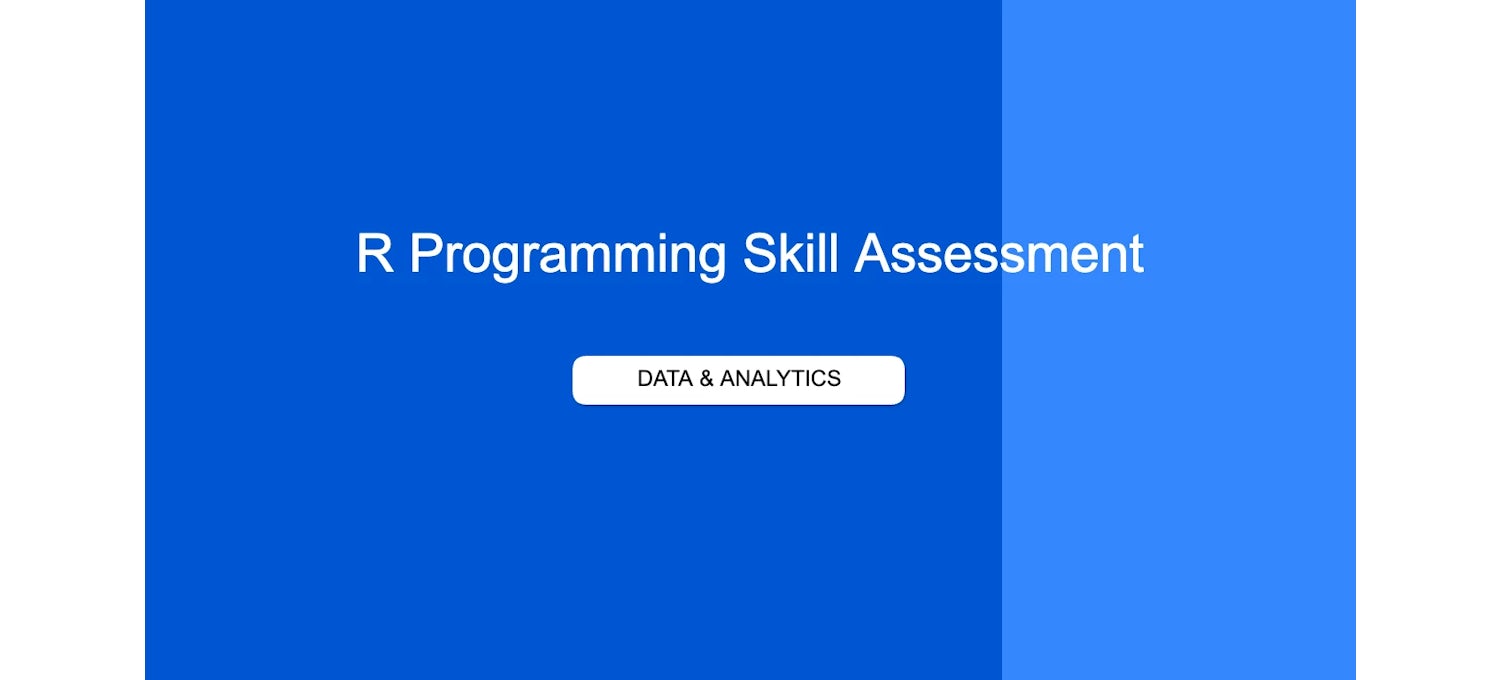R Programming Quiz: Assess Your Skill Level
Test your R programming skills with this quick assessment. Answer 10 multiple-choice questions to get your score, then check the Scoring Guide to find your level and recommended learning path.

R Programming Quiz
R programming is one of the skills employers in the data science industry most frequently request. It is a powerful and versatile language primarily used in data analysis, statistics, and data science. R programming has become essential for professionals in these fields, offering robust tools for statistical modeling and data visualization. With its ability to handle large datasets and perform complex analyses, R has gained significant popularity across healthcare, finance, and marketing industries. Its key features, such as a wide range of libraries and packages, make it highly flexible and efficient.
Answer the following skill-based R programming questions and click Submit to calculate your score. Use your score to find recommendations that align with your current skill level and explore career paths that interest you.
Test Structure
10 multiple-choice questions
Takes approximately 5-10 minutes
Immediate results with career recommendations
Custom learning paths based on results
1. What is the correct way to create a vector in R?
2. Which function would you use to remove missing values from a dataset?
3. What does the pipe operator %>% do in R?
4. Which package would you use for data visualization?
5. What is the difference between a list and a data frame?
6. Which function would you use for linear regression?
7. What does this code do?
mtcars %>% group_by(cyl) %>% summarise(mean_mpg = mean(mpg))
8. What is the purpose of lapply()?
9. Which statement about factors in R is correct?
10. What does the tidyr package primarily do?
Scoring Guide & Course Recommendations
Your quiz score above aligns with a general proficiency level of beginner, intermediate, or advanced. Match your score to the ranges below and explore the recommended course.
0-30: Beginner Level
Skill Level: New to R programming
Recommended Coursera Courses:
R Programming by Johns Hopkins University
R basics
Data types and structures
Basic functions
Introduction to R for Data Science by IBM
Programming fundamentals
Basic data manipulation
Data Science: Foundations using R by Johns Hopkins
R basics
Data manipulation
Basic visualization
40-70: Intermediate Level
Skill Level: Familiar with R basics, ready for advanced concepts
Recommended Coursera Courses:
Data Analysis with R by IBM
Statistical methods
Data analysis
Hypothesis testing
Advanced R Programming by Johns Hopkins University
Data manipulation with dplyr
Advanced visualization
Statistical analysis
Data Visualization & Dashboarding with R Specialization by Johns Hopkins
ggplot2 mastery
Complex visualizations
Interactive graphics
80-100: Advanced Level
Skill Level: Experienced R programmer
Recommended Coursera Courses:
Clustering and Classification with Machine Learning in R by Packt
Machine learning techniques in R
Data pre-processing and feature selection
Advanced R Programming by Johns Hopkins
Advanced r programming techniques
Professional package development
Machine Learning Algorithms with R in Business Analytics by the University of Illinois
Regression analysis for business problems
Comprehensive machine learning framework
Skills Covered by Level
As you progress in your R programming career, different levels have different skills, and here are some common ones.
Beginner Level
Basic syntax
Data types and structures
Basic functions
Simple data manipulation
Basic plotting
Reading/writing data
Intermediate Level
Data wrangling with tidyverse
Statistical analysis
Advanced visualization
Package usage
Basic modeling
Data cleaning
Advanced Level
Machine learning
Advanced statistics
Package development
Production deployment
Performance optimization
Complex data analysis
Career Paths
Your R programming career path will be unique to your strengths and interests. Below are some common roles at different skill levels. Explore our Web Development Career: Decision Tree to understand better how your R programming skills can take your career in an exciting direction.
Beginner Level: Junior Data Analyst, Research Assistant, Statistical Assistant
Intermediate Level: Data Analyst, Biostatistician, Market Research Analyst
Advanced Level: Data Scientist, Senior Statistician, Quantitative Researcher
You can start programming in R today by enrolling in a beginner-focused online course like Data Analysis with R Programming. Led by Google, you’ll explore fundamental concepts like functions, variables, and data types. Additionally, you can gain insights into performing basic formatting with R Markdown and generate visualizations in R.
Coursera
Writer
Coursera is the global online learning platform that offers anyone, anywhere access to online course...
This content has been made available for informational purposes only. Learners are advised to conduct additional research to ensure that courses and other credentials pursued meet their personal, professional, and financial goals.